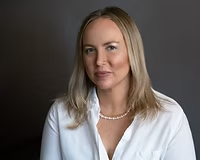The sanctuary at Emmanuel Lutheran Church in Two Harbors was filled to capacity last Friday night, with folks who came to hear Reverend Angela Denker speak about Christian nationalism. Reverend Denke has written two books on the subject (Red State Christians and Disciples of White Jesus: The Radicalization of American Boyhood). She writes for The Star Tribune and has been invited to speak as an expert commentator on NPR, CNN, SkyNews and the BBC. She also serves as Pastor of Visitation and Public Theology at Lake Nokomis Lutheran Church in Minneapolis.
Christian nationalism is based on the notion that America is a Christian nation, founded on Christian principles and therefore should be structured politically and socially around Christian values and teachings. Reverend Denker’s definition cuts closer to the point. She writes, “Christian nationalism is a version of the idolatrous Theology of Glory, which replaces the genuine worship of God with worship of a particular vision of America, often rooted in a revisionist history of white people in the 1950s, before the Civil Rights movement or the women’s movement. Christian nationalism supports a violent takeover of government and the imposition of fundamentalist Christian beliefs on all people. Christian nationalism relies on a theological argument that equates American military sacrifice with Jesus’ sacrifice on the cross. It suggests that Christians are entitled to wealth and power, in contrast to Jesus’ theology of the cross, which reminds Christians that they too have to carry their cross, just as their crucified savior did”.
From a theological standpoint, Christian nationalism is patently heretical. In the biblical account of Jesus before Pilate (John 18: 33 – 40), Jesus clearly responds to Pilate’s questions about whether or not his kingdom is political by stating, “My kingdom is not of this world”. From a historical standpoint, Christian nationalism violates the First Amendment of the Constitution which states “Congress shall make no law respecting an establishment of religion, or prohibiting the free exercise thereof.” Our founders had first hand knowledge of the dangers of religious nationalism.
If we want to keep our republic, wisdom would suggest that we cultivate opportunities for open discussion in our communities, our churches and our schools, about what it means to be American, what it means to be a person of faith and why imposing one religious perspective on everyone is a clear violation of both the tenets of Christianity and the Constitution.




